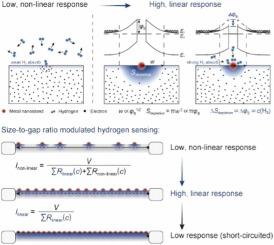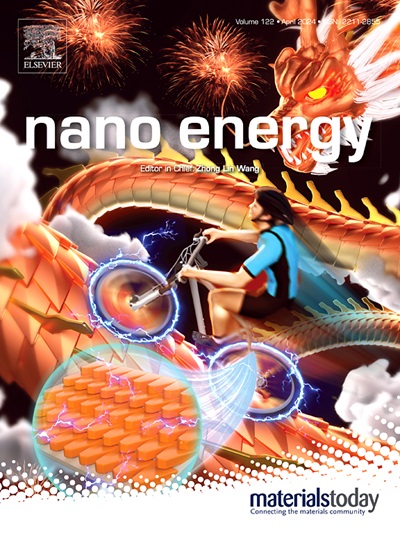Pd Nanoislands-Modified ZnO Nanowire-Network for Sensitive and Linear Hydrogen Sensing
IF 16.8
1区 材料科学
Q1 CHEMISTRY, PHYSICAL
引用次数: 0
Abstract
To facilitate the safety use of hydrogen fuel in aerospace applications and in hydrogen fuel cell vehicles, there is a high demand for hydrogen sensing technology with both merits of high sensitivity and high linearity. However, it is hard to integrate these two advantages together in just one device. Here, we designed and developed a hydrogen-sensitive Pd nanoislands-modified ZnO nanowire-network structure (Pd-ZnO nanoisland structure) for sensitive and linear hydrogen sensing. By optimizing the size-to-gap ratio of Pd nanoislands, we enhanced the response of the Pd-ZnO nanoisland structure sensor (Pd-ZnO sensor) more than 12 times larger than that of the pure ZnO nanowire-network sensor (without Pd nanoislands), and decreased its limit of detection down to 100 ppb at 150 °C low temperature. On the premise of high sensitivity, the sensor also has a remarkable sensing linearity (R2 >0.9969) in the whole detecting range and the full operating temperature range as designed. The high sensitivity together with high linearity can maximize the signal-to-noise ratio and facilitate the calibration of sensors. For example, only single calibration at a specific concentration can meet the sensing of Pd-ZnO sensors in whole concentration range. This study of utilizing noble metal nanoislands modifying metal oxide semiconductors provides an opportunity for hydrogen sensors with high sensitivity and high linearity integrated in one device.

用于灵敏线性氢传感的钯纳米带修饰氧化锌纳米线网络
为了促进氢燃料在航空航天应用和氢燃料电池汽车中的安全使用,对同时具有高灵敏度和高线性度优点的氢传感技术的需求量很大。然而,要将这两个优点集成到一个装置中是很难的。在此,我们设计并开发了一种氢敏钯纳米岛修饰氧化锌纳米线网络结构(Pd-ZnO 纳米岛结构),用于灵敏、线性的氢传感。通过优化钯纳米岛的尺寸与间隙比,我们提高了钯-氧化锌纳米岛结构传感器(Pd-ZnO 传感器)的响应速度,比纯 ZnO 纳米线-网络传感器(不含钯纳米岛)的响应速度提高了 12 倍以上,并将其在 150 °C 低温下的检测限降至 100 ppb。在高灵敏度的前提下,该传感器还在整个检测范围和设计的整个工作温度范围内具有显著的传感线性度(R2 >0.9969)。高灵敏度和高线性度可以最大限度地提高信噪比,方便传感器的校准。例如,仅在特定浓度下进行一次校准就能满足 Pd-ZnO 传感器在整个浓度范围内的传感要求。这项利用贵金属纳米带修饰金属氧化物半导体的研究,为将高灵敏度和高线性度集成在一个器件中的氢传感器提供了机会。
本文章由计算机程序翻译,如有差异,请以英文原文为准。
求助全文
约1分钟内获得全文
求助全文
来源期刊

Nano Energy
CHEMISTRY, PHYSICAL-NANOSCIENCE & NANOTECHNOLOGY
CiteScore
30.30
自引率
7.40%
发文量
1207
审稿时长
23 days
期刊介绍:
Nano Energy is a multidisciplinary, rapid-publication forum of original peer-reviewed contributions on the science and engineering of nanomaterials and nanodevices used in all forms of energy harvesting, conversion, storage, utilization and policy. Through its mixture of articles, reviews, communications, research news, and information on key developments, Nano Energy provides a comprehensive coverage of this exciting and dynamic field which joins nanoscience and nanotechnology with energy science. The journal is relevant to all those who are interested in nanomaterials solutions to the energy problem.
Nano Energy publishes original experimental and theoretical research on all aspects of energy-related research which utilizes nanomaterials and nanotechnology. Manuscripts of four types are considered: review articles which inform readers of the latest research and advances in energy science; rapid communications which feature exciting research breakthroughs in the field; full-length articles which report comprehensive research developments; and news and opinions which comment on topical issues or express views on the developments in related fields.
 求助内容:
求助内容: 应助结果提醒方式:
应助结果提醒方式:


